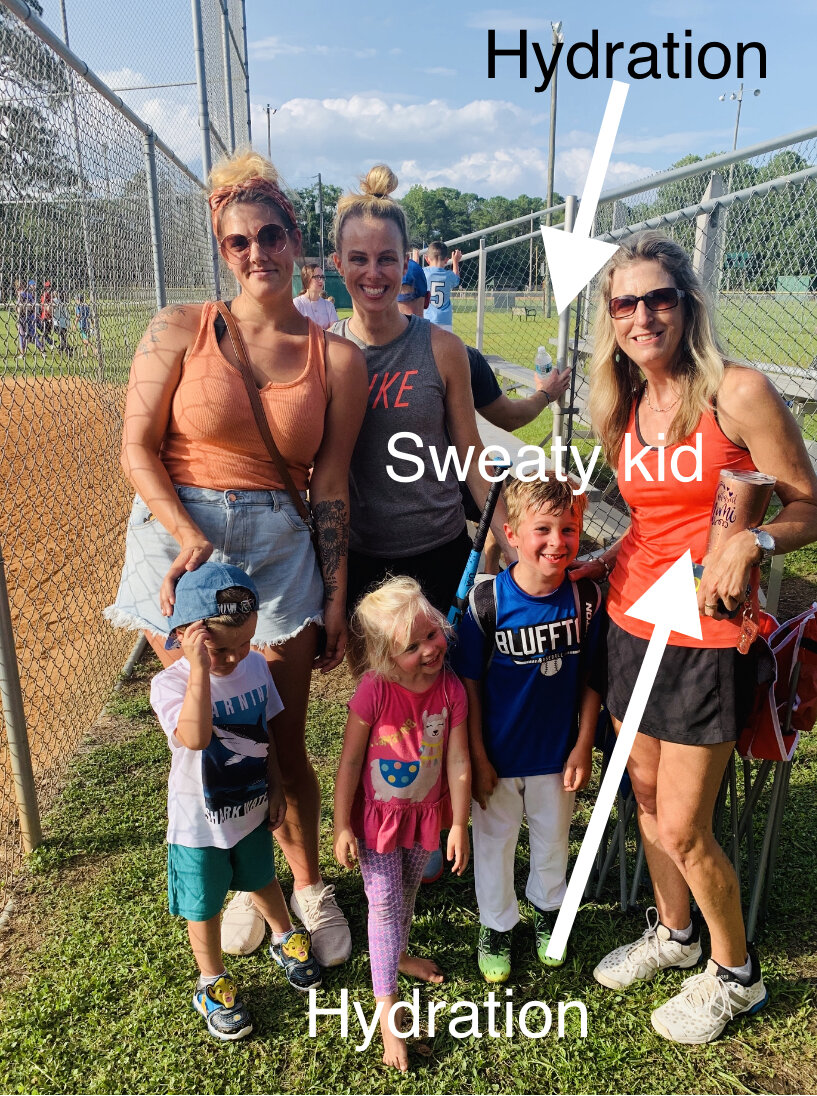Did you know there is a holiday coming up soon?! The 4th of July, I cannot even believe it’s already here. Usually I look forward to running a 5k in the morning, going to the pool with the kids, grilling out with our neighbors, and watching fireworks at night. This year is going to look different seeing as we are, probably like you, avoiding large crowds due to social distancing. However, there is one thing you can count on being consistent this year: the HEAT! Heat can be incredibly dangerous, even life threatening, so it is important to be informed. First, let’s dive into understanding heat, water, the human body, and how they all interact.
Heat+the Body
When exposed to extreme conditions, your body goes into survival mode working to maintain homeostasis. Your body uses sweat and breathing to help cool you off when you are exposed to heat. When the body becomes unable to cope with the heat and these cooling systems become overwhelmed, that is when you have a serious issue like heat exhaustion and heat stroke. Your body does have the ability to acclimate to extreme conditions, via exposure over a 7-10 day period. This will not protect you from a heat wave however, since they come on quickly and intensely.Heat+Water
Sweat is one of the built in defenses our body has against overheating. The average person has 2.6 million sweat glands which are activated by the brain to release water to the surface of the skin. As the water evaporates from the skin, it creates a cooling affect on the body. If you live in an area with high humidity, you might notice it’s harder to cool down. That’s because sweat has a difficult time evaporating into moisture rich air, vs dry air, making it easier to overheat.
Water+the Body
Water is a very important nutrient in your body. In fact, 76% of muscle is composed of water, therefore, becoming dehydrated or losing water can be detrimental to the function of muscles. Water is important for maintaining a normal blood volume so that your heart can pump blood effectively. Water helps to get rid of toxins through perspiration, urination, and the lymphatic system. It maintains your body temperature, regulates your bowel movements, and helps lubricate your joints and connective tissue. Water is so important that if you are feeling thirsty, you have likely already lost 1% water content. At 2% loss, you may experience severe fatigue and cardiovascular problems.
Okay, so you get it. Heat can have major impact on your body. Your body has mechanisms to deal with the heat, but requires plenty of water in order to work properly. Water helps to regulate several systems your body from your cardiovascular system to your gastrointestinal tract. Now, here is how to apply this knowledge with 3 tips to stay cool and hydrated in the heat:
Drink Water Before, During, and After Activity
If you want a more detailed outline, try this from the American Council on Exercise (ACE):
• Drink 17-20 oz. 2-3 hours before exercise
• Drink 8 oz. 20-30 minutes before exercise
• Drink 7-10 oz. every 10-20 mins during exercise
• Drink 8 oz. no more than 30 mins after exerciseThis will vary depending on your fitness level, type of exercise you are doing, environment, etc.
Dress with Intention
When it comes to exercise attire, stick to comfort and functionality. Don’t wear clothing that is restrictive or that makes you uncomfortable. If you are already getting your heart rate up with exercise, the last thing you need is to jack it up more with agitation from ill-fitting clothing. Help your body do its job to regulate your body temperature by wear something nice and light (ideally moisture wicking) to take advantage of your sweat to cool you off. When it comes to foot wear, make sure you have close fitting light socks. Heavy socks, or socks that are too loose fitting can bunch up in your shoes as you run or work out, causing blisters.
Eat your Water
80% of the water you take in actually comes from drinking water, but 20% comes from what you eat. Make sure to eat plenty of fresh fruits and veggies with high water content, such as watermelon, strawberries, cantaloupe, oranges, cucumber, celery, iceberg lettuce, green bell peppers, and spinach. You can also help your body absorb water and prevent dehydration by taking probiotics.
Are you wanting to run again, or get into a regular exercise program, but don’t quite feel ready? Click here to schedule an in-depth evaluation today to find your areas of weakness and develop a safe, customized approach!
Dr. Ashley Romine, DPT
Owner / Physical Therapist
Athlete’s Mechanic, LLC





